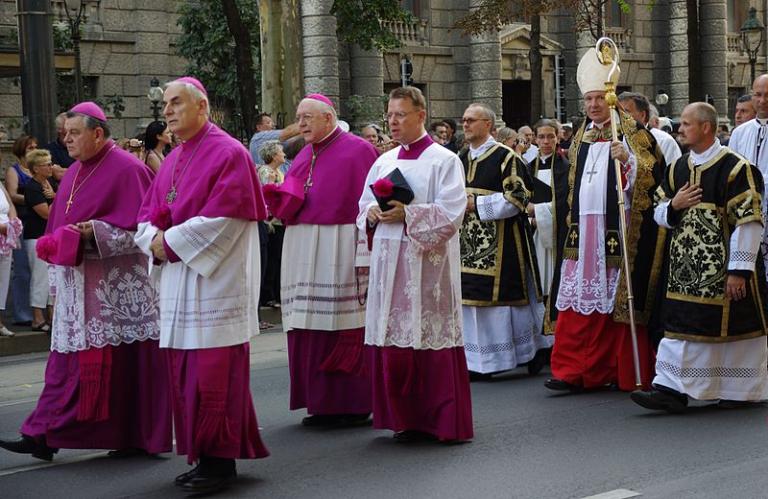
So, readers, I had intended to write up something on the Youth Synod, but there was so little meaningful information throughout the synod, and after it was over, the final document was so disappointing that I didn’t feel there was much to say about it. Near as I could tell, the document was full of mindless platitudes like “we should listen to the young people” with a bit of a head-scratcher, out-of-nowhere paragraphs on synodality, tossed in for good measure.
And in the days following the synod it was easy to find posts lamenting this development, for instance at the National Catholic Register or the Catholic Herald in the UK, because, indeed, there is the potential of synodality, that is, devolution of much of the business of “being church” down to national bishops’ congregations or individual bishops, eventually turning the Catholic church into something much less “small-c catholic” – that is, with local bishops’ conferences not merely coming up with their own sense of the best way to minister to young people as the focus of the synod, or to Catholics in general, within the confines of universal doctrine and liturgy, but diverging in more substantial ways. One simple “synodal” change would be to allow each bishop or bishops’ conference to decide for themselves what the parameters around the ordination of married men might be, or whether women (religious or lay) heavily involved in ministry might be given some special status. One can also imagine that local churches might change “church law” by decreeing that, as an alternative to merging of parishes or priests driving from one church to another to say mass, lay people may hold communion services to meet the Sunday Obligation, or, in a quest to follow a mega-church Sunday morning model, that a “worship service” of praise music + sermon suffices. Taken even further, would this mean allowing bishops’ conferences to re-interpret teachings on contraception, non-marital sex, divorce, LGBTism, etc., in such a way as to make the “real” church teaching a sort of vague ideal which can be discarded for any sort of “good reason,” and elevating “conscience” to so high a position that so long as one does what “feels right” there’s no need to take into account church teachings on these issues, or even using the desire for “pastoral care” as a reason to bless nonmarital unions? I don’t know. It seems like a mess, like a very risky endeavor and it certainly appears that it was a betrayal of the young people themselves to use a synod claimed to be seeking to find better ways to minister to them, in order to advance the cause of synodality — but on the other hand, it hardly seemed like the idea of a Synod on Youth was well-conceived enough in the first place to emerge with any new insights.
So that being said, the latest gathering of bishops was not really on my radar until I started seeing tweets this morning. And whaddaya know, there’s a Fall General Assembly going on now, at which the U.S. bishops were scheduled to vote on a series of reforms which would have provided the same sort of accountability for bishops as for priests — except that the surprise of the morning was the Vatican instructing them not to conduct such a vote until after the general meeting of bishops to discuss the topic in February. What is going on, why the Pope would prevent this, I don’t understand. Maybe he has the intention of having all bishops implement the same measures and doesn’t want non-American bishops to feel like they’re being forced to copy the U.S. But maybe this is a stalling tactic.
But at the same time, the bishops’ yammering about “we have to regain trust,” just doesn’t do anything for me. Cupich is full of nice words, but when it comes down to it, when his feathers were ruffled because he said some pretty appalling things in an interview and then got upset that the reporter, well, reported on it, he forced every parish in the Archdiocese to read a letter at mass in which he defended himself and criticized the news station. Yes, he ultimately apologized for his words during that interview, but, to the best of my knowledge, he did not apologize to the reporter herself (see this letter from the station manager), nor to the parishes for his abuse of his power in mandating this letter.
I admit that I was skeptical of him in the first place – I tried to balance out the fact that every time I heard about him, it was in the context of some sort of political action like illegal immigration amnesty advocacy, with the intellectual recognition that the newspaper is naturally more likely to report on his political activities than whatever ministry he might be up to with Chicago’s Catholics. But it’s tough to see what he’s up to and not feel that his attitude is that suburban Catholics just need to take care of themselves, so long as they keep sending money downtown — and all the more since I am convinced that his 2015 Archdiocese-mandated fundraising campaign, with the seemingly-incessant asking for money, had the effect of even emptier pews.
But I suppose that’s really the bottom line, anyway: it’s up to the parishes. Which makes it harder, of course — you’d want to have a charismatic (small-c charistmatic) bishop who can, through his leadership, help parishes that don’t know how to get from here to there, but if you don’t have that, you have to do the best you can. In my case, “doing the best I can” at the moment means engaging in a quest, not even to do something to help the parish improve in some fashion, but just to keep going the after-mass donut serving. (How’s it going? Not so good. Not quite to the point of putting up the sign, “because you are all such a sh***y bunch of parishioners who want everything handed to them, and have collectively ignored repeated requests for help, there is no coffee & donuts,” but still not good.)
So it kind of stinks. How’s your Monday going?
Image: https://commons.wikimedia.org/wiki/File:20110716_Otto_von_Habsburg_funeral_procession_2280.jpg; By Jakub Hałun [GFDL (http://www.gnu.org/copyleft/fdl.html) or CC BY-SA 4.0 (https://creativecommons.org/licenses/by-sa/4.0)], from Wikimedia Commons











